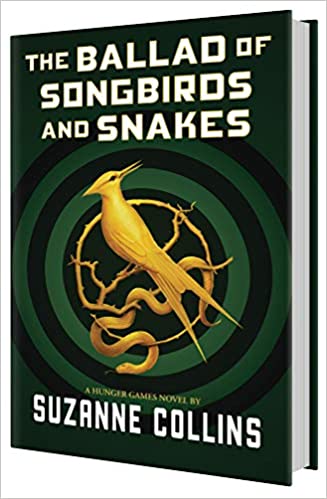‘The Ballad of Songbirds and Snakes’ review: more than just President Snow’s origin story

June 10, 2020
Long before Katniss Everdeen made her mark in The Hunger Games by volunteering to participate in the Games in the place of her younger sister, Coriolanus Snow makes his own mark on Panem.
The Ballad of Songbirds and Snakes is a new novel set in The Hunger Games universe by bestselling author Suzanne Collins. The novel takes place during the Tenth Hunger Games and follows 18-year-old Coriolanus Snow, who will later become the president of Panem. Coriolanus has seen hardship in his own life; both of his parents lost their lives during the war that led to the Treaty of Treason and the Hunger Games. The respect for his once-great family has subsided, but Coriolanus has the chance to redeem his family name by successfully mentoring a tribute in the Hunger Games. This story highlights the collection of Coriolanus’ choices that lead to the ruthless and cunning character readers see in The Hunger Games.
One of the most interesting aspects of this book, for me, is the expansion of information on Panem, especially when placed within the context of the original Hunger Games trilogy. There are many familiar names and more explanations of how the world of Panem operates, such as how Peacekeepers are trained, how citizens in the Capitol live, and insight on the war between the Capitol and the districts and the earliest Hunger Games.
Despite the interesting information on the world of Panem, I did not particularly like the story and found the pace to be rather slow. This book is told from a third-person limited point of view, that is, readers see what Coriolanus sees and know what he is thinking, but he is referred to in the third person. This contrasts with The Hunger Games trilogy because these books are told from Katniss’ first-person point of view. I think it is because of this that the writing felt off to me, especially because Katniss’ voice is strong and unique, while Coriolanus’ voice seems weaker in comparison.
While reading The Hunger Games, I was captivated by the characters and story. In The Ballad of Songbirds and Snakes, I was much more captivated by the ideas it brought forth. It is certainly a book that has left me thinking, especially considering this book can directly relate to the current state of affairs in America, namely, the protests that have erupted after George Floyd’s death. In the book, Capitol citizens refer to people from the districts with language that deems them less than human, saying they belong in cages, are second-class citizens, and are barbaric creatures. Similarly, some people refer to black people with derogatory words that suggest they are less than people when this is certainly not the case. Coriolanus distinguishes himself from district people, saying that it is clear people from the Capitol are superior. However, there are others in the book that acknowledge that Capitol citizens are perceived as better than district people simply because they are fed better and have better dental care; people from the districts do not deserve to be ridiculed or beaten simply because of where they are born, just as black people do not deserve judgment or brutality because of the color of their skin.
This book also discusses the role of government and the state of human nature. These questions were posed by Enlightenment thinkers such as John Locke, Thomas Hobbes, and Jean-Jacques Rousseau. Collins discusses her inspiration for the book from Enlightenment thinkers in an interview with author David Levithan in the back of my copy of the book (I have the Barnes & Noble YA Book Club Exclusive Edition). Collins says that she wanted to expose young readers to the ideas of just war in The Hunger Games and her other series, The Underland Chronicles, and that focusing on the idea of just war eventually leads to the discussion of human nature. Thus, The Ballad of Songbirds and Snakes aims to discuss human nature to accompany the ideas proposed in The Hunger Games.
Coriolanus himself is firm in his conviction that the Hunger Games are a just punishment for the districts to remind them that people are born evil and the world would descend into chaos without the Capitol to enforce laws. However, other characters, both from the Capitol and from the districts, express that humans are born good and it is the world they are born into which corrupts them. Additionally, one of Coriolanus’ friends, Sejanus, who was originally born in District Two but now lives in the Capitol, questions why the Capitol forces people in the districts to participate in the Games; is it not the government’s job to protect all its citizens, regardless if they are born in the Capitol or the districts?
I have not been able to stop thinking about this book since I finished it. This book outlines the story of someone who loves to be in control and how that love of control leads him to excuse his increasingly brutal behavior. Regardless if you are a fan of The Hunger Games or not, I encourage you to read this book to explore your own thoughts on the role of government and of your own prejudices you may hold.








